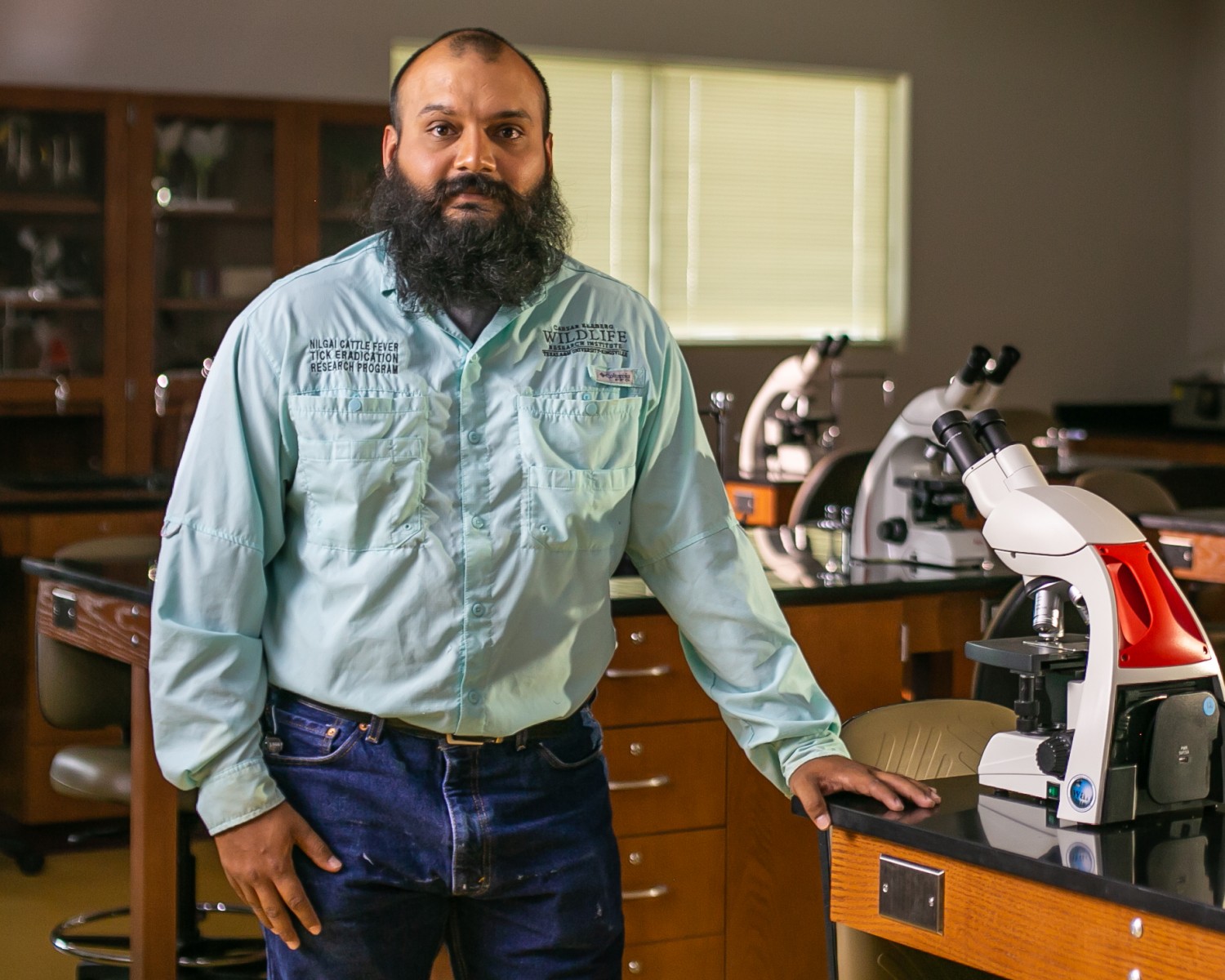Ernesto Reyes: Research into Cattle Fever Ticks
As many Texas ranchers could tell you, the cattle fever tick carries parasites that infect cattle and can eventually kill them. Once infected, the microscopic parasites destroy the cattle’s red blood cells and make them unfit for human consumption. One widespread outbreak can have the potential to cause billions of dollars in damages.
Ernesto Reyes is one South Texas College student who knows plenty about the pesky cattle tick. That’s because the biology scholar has spent the last two years immersed in research focused on controlling the tick population. His research approach has been to control the spread of cattle fever ticks not with chemicals, but with biology.
“Our work revolves around the parasite that emerges from the cattle fever tick,” explains Reyes. “We’re looking at the effects of nematodes [a microscopic worm], which we spray on the ticks. The nematodes then feed on the ticks and in doing so, they kill them.” Reyes has been measuring the effectiveness of different concentrations of nematodes in killing the disease-bearing ticks.
“In all our trials, we’ve noticed a slight decrease in the tick population, but that’s been in a controlled environment,” says Reyes. “Our next step is a longevity trial to get the nematodes to stay active longer in field conditions.” The work has been rewarding so far, but it can also be tricky. The nematodes tend to dry out and die in the hot Texas sun. Reyes is getting his hands dirty working through these complicated issues.
Expanding Opportunities for Students
South Texas College is dedicated to expanding the opportunities it provides for its STEM-focused students. The College has recently partnered with the U.S. Department of Agriculture (USDA) and several larger universities in a grant program called “Step 2.” The goal is to involve students in research endeavors with local scientists, increasing opportunities to further their education and, eventually, have careers within the USDA.
Reyes began researching in summer 2018, and will now continue his research with the Texas A&M Caesar Kleberg Wildlife Research Institute. Students in their grant program receive a stipend so they can focus on their field and complete lab work without worrying about finances.
“I met people from all over the country, all presenting on something they’ve studied in a field they enjoy. It was super exciting. I spoke with people with different backgrounds and some who had gone to places like Kenya to continue their work. I would find that so interesting,”
“Through opportunities like this, students learn they must aim high in order to continue in the field,” says Dr. Thomas Ndolo, assistant professor of biology and one of Reyes’ instructors. “They must get a four-year degree, and hopefully go on for a master’s or Ph.D. We help develop that pipeline.”
Reyes says he felt well-prepared to dive into biological and ecological research. “Before I did any field work, I spent two weeks in the biotech workshop, learning about the equipment in the labs and about data collection and analysis. South Texas College did a great job as far as preparing me for whatever we may come across in the field. And I meet with Dr. Ndolo regularly to go over findings from my research.”
It was through the grant that Reyes was able to travel to Washington D.C. to deliver a PowerPoint presentation and poster on his findings to the American Association for the Advancement of Science. Those four days meant a lot to the Valley native.
“I met people from all over the country, all presenting on something they’ve studied in a field they enjoy. It was super exciting. I spoke with people with different backgrounds and some who had gone to places like Kenya to continue their work. I would find that so interesting,” he says with enthusiasm.
Reyes has been corresponding with another program attendee who keeps him informed on job and research opportunities in Colorado and other states. Clearly, the world of opportunities is opening up, and the holistic nature of his education—a mix of academics and field work—has been essential in broadening his horizons. He expects to graduate with his associate degree in biology in 2020.
Nurturing a Love of Science
At one time, Reyes thought he might want to be an architect. But his high school environmental science teacher, Ms. Santiago, fostered his love of science. She was also an instructor at South Texas College, where he was taking some classes while still in high school. In addition, Dr. Dan Murray, the principal investigator for the Step 2 grant, has been influential in fanning the flames of his interest in biology.
Dr. Ndolo has no doubt that Reyes will excel in the field. “He’s a very mature student with a good work ethic, and he puts in more than what is needed. Plus he’s done a lot of field work, sometimes under difficult conditions.”
When he graduates from South Texas College, Reyes plans to pursue a Bachelor’s degree, perhaps at Texas A&M or the University of Texas Rio Grande Valley.
“I definitely want to continue with ecology, particularly the study of mammals,” Reyes says. “Disease ecology seems to be growing as well, and that’s also really interesting to me.”
It’s interesting to think his future career in ecology and understanding what makes mammals tick, all began at South Texas College with the study of a pesky tick.



